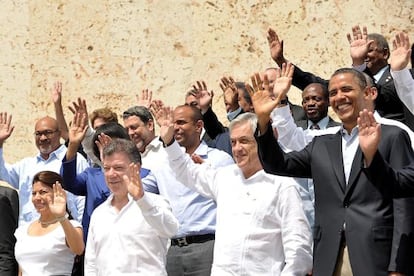Regional summit ends without statement
Cuba's future attendance and Falklands sovereignty divides American leaders

After two days of frank talks with the absence of two key players and dismay over the fact that Cuba was ignored again, the leaders and representatives of 33 nations failed to come up with a final declaration at the VI Summit of the Americas - casting doubt on whether more regional meetings will be held in the future.
Despite this bleak outlook, Colombian President Juan Manuel Santos, the host of the summit, which was held in Cartagena, denied that this year's meet-up was a failure. The leaders attending decided not to issue a final declaration after failing to agree on the inclusion of clauses regarding Cuba's future presence and on Argentina's sovereignty demands over the Falkland Islands.
"A majority of the participating nations called for a peaceful solution to the [Falklands] conflict," as well as "a desire that Havana be present" at the next meeting to be held in Panama in 2015, Santos said, adding that "it was not expected that there would be a unanimous agreement" over either of these two issues.
Following Santos' inaugural speech, Argentinean President Cristina Fernández de Kirchner, who had been pushing to include the islands dispute as a major discussion at the summit, went up to the Colombian leader and scolded him: "You forgot to mention the Falklands."
Obama and Canadian Prime Minister Stephen Harper were alone in their opposition to inviting Cuba to the next summit even if the political situation in that Caribbean island had not changed, officials said.
The ALBA bloc of leftist nations - which was founded in 2004 by Venezuela and Cuba - announced on Sunday that it would not be attending the next summit in Panama unless Havana is on the list. The bloc also includes Antigua and Barbuda, Bolivia, Dominica, Ecuador, Nicaragua, St. Vincent and the Grenadines. Suriname, St. Lucia and Haiti have observer status.
Two weeks ago, Ecuadorean President Rafael Correa said that he was not going to the Colombia summit if Cuba wasn't present. Venezuelan President Hugo Chávez also excused himself, but for medical reasons, saying that he had to undergo another session of chemotherapy in Havana to treat his cancer.
But one of the touchiest and most controversial issues brought up officially for the first time at the summit was a call for the discussion over the legalization of drugs in an effort to curtail spiraling narco-violence in the region, especially in Mexico where nearly 50,000 people have died since 2006.
Although Obama and Santos continue to hold different views - Santos favors looking at legalizing some drugs; Obama opposes any type of legalization - the leaders agreed to allow the Organization of American States (OAS) to initiate a formal study on the issue. "We are going to see whether [current] policies are working or if there are more efficient and less costly ways to confront this problem," Santos said.
Obama told business leaders at the summit that such discussions were "legitimate."
Mexican President Felipe Calderón said that leaders also proposed creating an inter-American center to combat organized crime, especially drug trafficking, and will have its headquarters in Mexico City.
Secret Service sex scandal
President Barack Obama's attendance at the Summit of the Americas last weekend was marred by a sex scandal involving members of his Secret Service detail and US military officials, who reportedly hosted local prostitutes at their hotel for an evening of carousing.
Eleven members of the US Secret Service were sent back to Washington from Cartagena, Colombia and placed on administrative leave, and investigators are determining whether as many as 10 others may also be involved. Investigators have also traveled to Colombia to interview as many as 21 women to hear their side of the story, The New York Times reported Wednesday.
"We are embarrassed," said General Martin E. Dempsey, the chairman of the Joint Chiefs of Staff, during a briefing with reporters at the Pentagon on Monday. "We let the boss down because nobody is talking about what went down in Colombia other than this incident."
The incident occurred on the night of April 11. ABC News reported that the Secret Service members, who had been sent as part of an advanced team before Obama's visit, bragged that they "were here to protect the president" during a call to a nightclub brothel called The Pleyclub. The Secret Service members paid for whiskey and asked the club's owners to bring at least two of the girls to the hotel where they were staying. But a disturbance broke out outside the club over payment of a bill, according to a bouncer and a police officer, who was called to the scene. The following morning, one of the girls reportedly demanded further payment at the hotel, which set off another dispute with one agent, and drew the attention of the hotel staff, who called the US Embassy, The Washington Post reported Tuesday.
The following day 11 Secret Service agents were replaced by another team, and the military confined five of its own officers to their room pending the investigation.
During a memorial service in Halifax to mark the centennial of the Titanic's sinking, Obama said that he "will be angry" if the allegations prove to be true.
Congress has already initiated its own investigation. "I find this to be so appalling," Republican Senator Susan Collins of Maine was quoted in the Post as saying. "I can't help but think: what if the women involved had been spies? It is such a breach of trust, and it's virtually unbelievable. I am truly shocked." Collins is the ranking member of the Senate's Homeland Security and Government Affairs Committee.







































